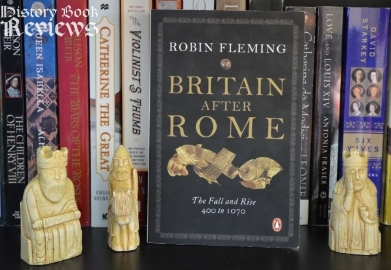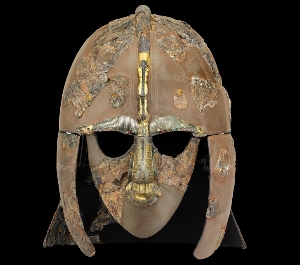Britain After Rome: The Fall and Rise 400-1070
by Robin Fleming

Overview
- Author: Robin Fleming
- Published: 2011
- Topics: England, Royalty, Archaeology, Anglo-Saxons, Romans, Medieval

Review
People frequently ask me if archaeology is really like Indiana Jones and the Last Crusade, and inquire as to the number of Nazis I have killed. Normally I roll my eyes and inwardly grimace, while maintaining a frosty politeness. But now I think there might be more to it, because in Robin Fleming's Britain After Rome I think I have found my own Holy Grail.
Britain After Rome is an extensive history of Britain from the last decades of the Roman Empire in the 400's to the period of the Norman Conquest in 1066, and it is based primarily on archaeological evidence. I don't know how to even begin to say how much of a jackpot this was for me, and how amazingly it combined my most desperate passions in one book (Medieval England and archaeology). And what makes the book really unique is that it does not tell the history of kings and great figures, but that of the common people and the societies they lived in. This population is nearly invisible in contemporary (and later) texts, so it is through Fleming's synthesis of archaeological discoveries that we can glimpse the ordinary people who called Britain home in the early medieval period.
What I really loved about Fleming's approach is that she believes all approaches to history should understand and discuss the material culture found by archaeologists, despite the fact that she herself is not an archaeologist. This bridges a crucial gap in the study of history, as most historians do not write about the archaeology of their subjects and archaeologists rarely write about history, and indeed their publications and excavation reports are not very accessible to the public. I may be biased, but I believe that history benefits immensely from a combination of the historical and archaeological approaches, and this is exactly what Fleming has done. And despite a few too many "ritual" interpretations (another treacherous thing to identify), Fleming shows a true understanding of the archaeological record and how it can be used, as well as how to avoid using it.

Helmet found during excavations at Sutton Hoo,
dating to the Anglo-Saxon period (early 7th c.).
The book proceeds through the centuries in a roughly chronological manner, analyzing different aspects of human life such as religion, culture, architecture, health and living conditions, food, language, war, and identity. Identity is the most notoriously elusive and dangerous thing to try to pin down about the past, but Fleming discusses it based on many facets of material culture and makes sensible arguments that are ultimately very believable. She supports the relatively new interpretation that, contrary to what people have believed for hundreds of years, the British people lived peaceably and interacted/interbred with the Angle, Saxon, and Jute (among others) newcomers, rather than the latter violently invading and replacing the former. The wealth of examples Fleming presents support this theory beautifully, and builds a new perspective through which to view this fascinating time period.
Ultimately Britain After Rome is concerned with the common folk of the early middle ages, and with what life was like for them. Fleming may not be able to give these people a voice, but she gives us their bodies and sometimes these can speak just as eloquently. The skeleton of an older man from the 4th century AD with dyed hair combed over his bald spot reminds us that people haven't really changed much in 1600 years. A young woman with disfiguring leprosy was awarded a unique and high-status burial, reminding us not to assume anything about social reactions to disease and deformity. On the material side of things, imported brooches and beads show how some men and women were adopting new fashions, and how lower status people were using knock-off goods to copy them. These are people we can recognize, like those that made rules forbidding drawing weapons in places where men were drinking alcohol. They are also mysterious to us, punishing church thieves by branding them on the face with the church key, and condemning clerics for having sex with people while being remarkably lenient on bestiality.
Britain After Rome is highly informative, filled with a mesmerizing and cohesive archaeological narrative unparalleled by anything I have ever read before. The style of the narrative is very scholarly, and may seem a little dry to those accustomed to books centered on individuals, or to those unused to discussions of the archaeological record. But in terms of the detailed information it gives about the people of this time period through the archaeology of their life and death, it is truly more exciting than 'Indiana Jones' archaeology could ever be.
At one point in my notes I found the following quote: "I kind of want to marry this book." I feel that this sums up my feelings about it better than anything else I could say.


